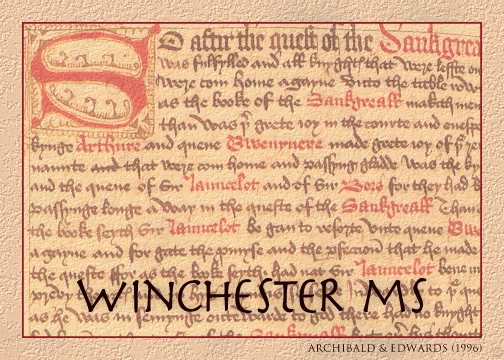

"...divers men hold opinion that there was no such Arthur; and that all such books as be made of him be but feigned and fables, because that some chronicles make of him no mention nor remember him nothing nor of his knights....And for the pass the time this book shall be pleasant to read in; but for to give faith and belief that all is true that is contained herein, ye be at your liberty."
Caxton, Preface to Le Morte Darthur
In 1934, a manuscript copy of Le Morte Darthur was discovered in the library of Winchester College (and now in the British Library) that is closer to Malory than Caxton's printed edition of 1485. Neither derives from the other and both are removed from Malory's original holograph. Curiously, although Caxton did not use the Winchester MS in preparing his printed text, it was in his possession at the time, as can be determined by type smudges on the manuscript. The leaves at the beginning and ending of the Winchester MS are missing, however, and must be supplied by Caxton's edition, of which there is only a single complete copy.
It is Caxton who divided the manuscript into books and chapters, making twenty-one books of approximately equal length out of the original four sections. Not all of these divisions are appropriate, however, as when he separates Malory's digression on love from the episode of Guinevere's Maying that inspired it. On the other hand, there are far fewer homoeoteleuta (accidental omissions in transcribing the text) in Caxton's text, which argues that he was using a manuscript other than Winchester.
To the concluding explicit of Malory's last tale, "Here is the ende of the hoole book of kyng Arthur and of his noble knyghtes of the Round Table...," Caxton adds his own colophon: "...thus endeth this noble and joyous book entytled le morte Darthur," applying to the whole volume what Malory had intended to be the title of his concluding tale. In spite of Malory's remark that this is his "hoole book," drawn out of the French, his most scholarly editor has insisted that the tales were eight separate romances and not a single composition.
One significance of the Winchester MS is that the colophons at the end of many of the tales contain autobiographical information about the author that was omitted by Caxton, including Malory's reference to himself as "a knyght presoner," which is perhaps understandable in a work that exhorts the reader to "Doo after the good and leue the euyl." It is evident from these end notes that Malory wrote Le Morte Darthur while in prison, completing it, as he says, in the ninth year of the reign of Edwards IV (sometime in the year 1469/1470).
A member of the landed gentry of Warwickshire in the English Midlands, Sir Thomas Malory was recorded as a knight by 1441. And yet, in spite of the chivalrous behavior of those other knights whose adventures and quests he recounts, Malory's own life was punctuated with a series of grievous crimes, including attempted murder, cattle raids, poaching, extortion, robbery, and rape. Twice he escaped from prison and twice he was specifically excluded by name from general pardons, the last while he was completing Le Morte Darthur.
For those who want to read Malory's Le Morte Darthur, there are several choices, each represented by one of the following titles:
The Works of Sir Thomas Malory (1990), edited by Eugène Vinaver and revised by P. J. C. Field (OUP), is the standard scholarly edition in three volumes and the first to incorporate the Winchester MS (in 1947). Controversially, Vinaver has regarded the material as comprising individual tales, which he emends from Caxton and the original French sources in an attempt to recreate what Malory was thought to have written.
Sir Thomas Malory: Works (1971), edited by Eugène Vinaver (Oxford Standard Authors), is a one-volume student edition based on Vinaver's 1967 edition above. Both retain the original fifteenth-century English spelling.
Sir Thomas Malory: Le Morte D'Arthur (1969), edited by Janet Cowen (Penguin Classics), is the Caxton edition, with modernized spelling and punctuation.
Sir Thomas Malory: Le Morte Darthur: The Winchester Manuscript (1998), edited by Helen Cooper (Oxford World Classics), modernizes the spelling but also abridges the text.